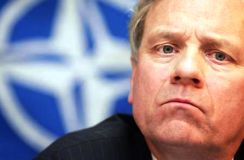African Union asks NATO more support for Darfur
Sept 22, 2006 (NEW YORK) — The president of the African Union asked NATO on Thursday to give more support for its peacekeepers in the violence-wracked Darfur region, NATO Secretary-General Jaap de Hoop Scheffer said.
 Scheffer said NATO should “answer positively and favorably” to the request from Republic of Congo President Denis Sassou Nguesso, who currently leads the African Union. He promised to take it back to officials at the alliance headquarters in Brussels.
Scheffer said NATO should “answer positively and favorably” to the request from Republic of Congo President Denis Sassou Nguesso, who currently leads the African Union. He promised to take it back to officials at the alliance headquarters in Brussels.
“I promise the president of the African Union that I as secretary-general will do everything I can with the allies to see that NATO can respond positively to these kinds of requests,” Scheffer said.
He spoke after a meeting of NATO member states in New York on the sidelines of the annual U.N. General Assembly session. The group did not discuss Darfur during its meeting.
NATO already provides airlift support and trains troops with the African Union force, which is sorely underfunded and underequipped. It has largely failed to control the violence that has left 200,000 dead in Darfur and displaced more than 2.5 million since 2003.
On Wednesday, the African Union extended the mandate of the force through the end of the year. It had wanted to turn over control of the peacekeepers to the United Nations, which would then expand and bolster the struggling force, but Sudan’s government has refused. President Omar al-Bashir claims that some members of the U.N. Security Council want to weaken and divide Sudan.
A decision to extend more NATO support to the African Union mission in Sudan would not require new approval from the alliance’s member states. The details would be worked out by its military planners, said Daniel Fried, U.S. assistant secretary of state for Europe.
“It is our view that this is another example of NATO’s increasing role around the world,” Fried said. “It can be called upon support in many places where NATO has not been present traditionally and is present today.”
Both Scheffer and Fried stressed that NATO involvement would not involve sending alliance troops to Darfur. Still, Fried said, planners should rule nothing out — even though such a move would almost certainly be opposed by al-Bashir and is highly unlikely.
“We have not considered NATO ground forces but I don’t want to start ruling out things,” Fried said. “That isn’t a hint, that is merely prudence in a situation that can change.”
(AP/ST)
